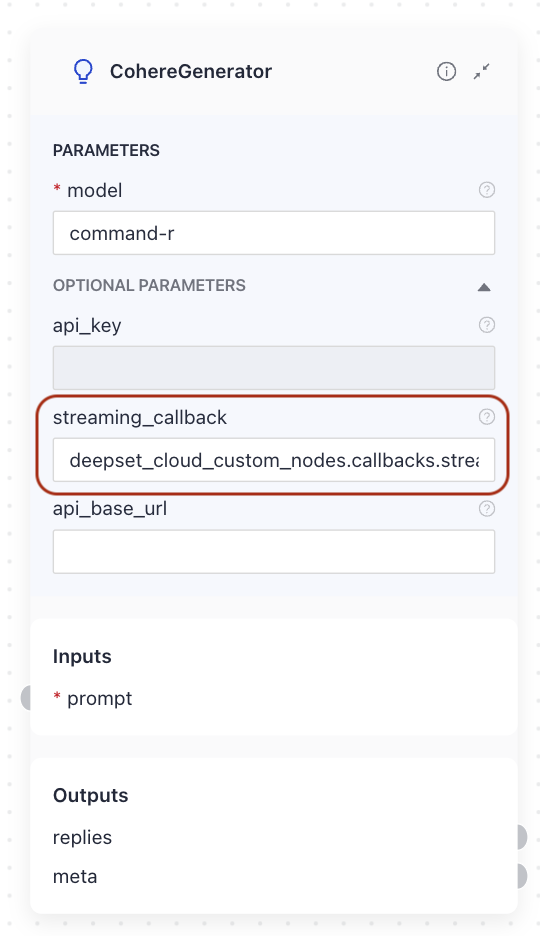Enable Streaming
Streaming refers to a large language model generating text as it's produced rather than waiting for the entire response to be ready before showing it. It's similar to watching someone type real-time. Enable streaming for the Generators in your pipelines.
About This Task
Streaming is a technique often used in chat interfaces. It makes the responses seem faster as users can immediately see the output and can start reading while the rest of the text generates. It also makes it possible to interrupt the LLM if needed. This is particularly useful for longer responses where waiting for the generation to complete may take a couple of seconds.
Haystack Enterprise Platform currently supports streaming only in synchronous pipelines. Streaming is not available if your pipeline has async_enabled: True. To use streaming, run the pipeline in synchronous mode.
Enabling Streaming
Enabling Streaming for Generators and ChatGenerators
To enable streaming, set the Generator's streaming_callback parameter to deepset_cloud_custom_nodes.callbacks.streaming.streaming_callback.
If your pipeline has multiple Generators, you can enable streaming for each one. The same applies to ChatGenerators.
If no streaming_callback is set, the last Generator in the pipeline streams.
Example of a Generator with Streaming
Here is an example of a Generator with streaming enabled:

YAML configuration:
CohereGenerator:
type: haystack_integrations.components.generators.cohere.generator.CohereGenerator
init_parameters:
api_key:
type: env_var
env_vars:
- COHERE_API_KEY
- CO_API_KEY
strict: false
model: command-r
streaming_callback: deepset_cloud_custom_nodes.callbacks.streaming.streaming_callback
Enabling Streaming for Agents
Streaming for Agents is enabled by default. You can check it by switching to the YAML editor and searching for the streaming_callback parameter. The parameter is set to deepset_cloud_custom_nodes.callbacks.streaming.streaming_callback.
Example of an Agent with Streaming
agent:
type: haystack.components.agents.agent.Agent
init_parameters:
# Chat Generator: Use the OpenAI one from Pipeline A
chat_generator:
type: haystack.components.generators.chat.openai.OpenAIChatGenerator
init_parameters:
api_key:
type: env_var
env_vars:
- OPENAI_API_KEY
strict: false
model: gpt-4o
streaming_callback: # this stays empty
tools:
api_base_url:
organization:
timeout:
max_retries:
tools_strict: false
system_prompt: You are a deep research assistant.
streaming_callback: deepset_cloud_custom_nodes.callbacks.streaming.streaming_callback # this setting enables streaming for the Agent
tools:
...
Streaming with API
You can use streaming with the stream API endpoints: Chat Stream and Search Stream. This is an example request to the Search Stream endpoint.
- cURL
- Python
curl --request POST \
--url https://api.cloud.deepset.ai/api/v1/workspaces/WORKSPACE_NAME/pipelines/PIPELINE_NAME/search-stream \
--header 'accept: application/json' \
--header 'authorization: Bearer DEEPSET_API_KEY' \
--header 'content-type: application/json' \
--data '
{
"debug": false,
"include_result": true,
"view_prompts": false,
"query": "who started all-girl bands?"
}
'
import requests
url = "https://api.cloud.deepset.ai/api/v1/workspaces/WORKSPACE_NAME/pipelines/PIPELINE_NAME/search-stream"
payload = {
"debug": False,
"include_result": True,
"view_prompts": False,
"query": "who started all-girl bands?"
}
headers = {
"accept": "application/json",
"content-type": "application/json",
"authorization": "Bearer DEEPSET_API_KEY"
}
response = requests.post(url, json=payload, headers=headers)
print(response.text)
Replace:
WORKSPACE_NAME: With the name of the workspace containing your pipeline.PIPELINE_NAME: With the name of the pipeline to use for search.DEEPSET_API_KEY: With your Haystack Platform API key.
Determining which Generator Streamed
If your pipeline includes multiple Generators with streaming enabled, you can determine which Generator streamed a specific chunk of data by checking its name in the API response. This information is available in the delta field.
Below is a partial example of a response from the Search Stream endpoint, showing two streaming-enabled Generators: chat_summary_llm and qa_llm.
{
"query_id":"290a1f96-57d6-4843-8ed7-2a224142398b",
"delta":{
"text":"girl bands?",
"meta":{
"index":0,
"deepset_cloud":{
"component":"chat_summary_llm" // this is the name of the Generator that streamed
}
}
},
"type":"delta"
}
{
"query_id":"290a1f96-57d6-4843-8ed7-2a224142398b",
"delta":{
"text":"Base",
"meta":{
"index":0,
"deepset_cloud":{
"component":"qa_llm" // this is the name of the Generator that streamed
}
}
},
"type":"delta"
}
Was this page helpful?